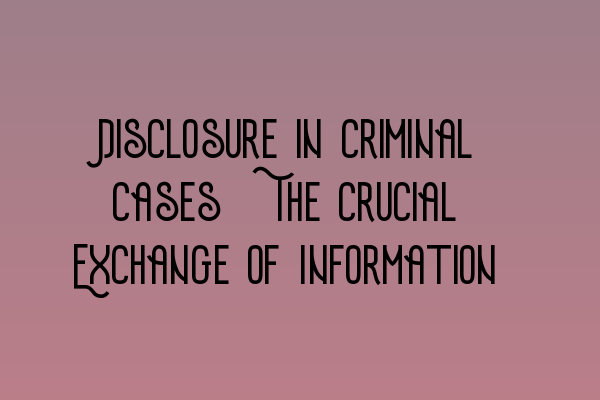Disclosure in Criminal Cases: The Crucial Exchange of Information
In any criminal case, the exchange of information, known as disclosure, plays a vital role in ensuring a fair trial and upholding the principles of justice. As a solicitor, it is essential to understand the intricacies of disclosure to effectively represent your clients and navigate through the challenges of the criminal justice system. In this article, we will delve deep into the concept of disclosure, its significance, and the practical aspects of handling disclosure in criminal cases.
Disclosure is the process of sharing information between the prosecution and the defense. It allows both sides to have access to essential evidence that may support or undermine their case. The principle of disclosure is founded on the belief that a fair trial can only be achieved if both parties have all relevant information at their disposal. This ensures that neither side is taken by surprise during the trial, and justice is served.
The importance of disclosure cannot be overstated. It promotes transparency, fairness, and ensures that the trial process is not biased towards one party. By disclosing all relevant information, the prosecution is able to discharge its duty of presenting the case fairly to the court. On the other hand, the defense can effectively prepare its case, challenge the prosecution’s evidence, and provide counter-evidence if necessary.
However, ensuring effective disclosure is not always a straightforward process. It requires careful attention to detail, coordination, and adherence to legal requirements. At SQE Criminal Law & Practice Law UK, we understand the complexities involved in handling disclosure. That’s why we have compiled this comprehensive guide to help you navigate through this crucial phase of a criminal case.
Firstly, it is important to recognize that disclosure is not a one-time event. It is an ongoing process that starts with the initial stages of an investigation and continues throughout the course of the trial. As a solicitor, you must stay vigilant and proactive in seeking disclosure from the prosecution while simultaneously fulfilling your duty to disclose relevant information to the other side.
One key aspect of effective disclosure is the identification of material that is subject to disclosure. This includes not only the evidence that supports the case of the prosecution or defense but also evidence that is potentially unfavorable or contradictory. It is important to cast a wide net and consider any material that may impact the credibility or reliability of witnesses, expert opinions, or other areas of contention in the case.
Once the relevant material is identified, the next step is gathering and organizing it in a manner that is easily accessible and understandable for both parties. This can involve reviewing police reports, witness statements, forensic evidence, expert reports, video or audio recordings, and other forms of evidence. It is crucial to maintain a clear record of the disclosed material and any subsequent changes or additions made during the course of the trial.
In addition to the core aspects of disclosure, there are specific rules and guidelines that govern the process. Familiarizing yourself with these rules is essential to avoid any procedural errors or omissions that could jeopardize your case. It is worth noting that recent changes in legislation and case law have placed an even greater emphasis on disclosure, highlighting its significance in ensuring a fair trial.
To enhance your knowledge and understanding of disclosure, we recommend exploring related articles on our website. These articles cover various aspects of criminal law and practice, offering valuable insights and analysis that can support your professional development and SQE preparation. Here are some recommended articles:
– Enhancing Your SQE Criminal Law Study Group Experience
– Decoding Criminal Evidence Rules: A Detailed Analysis
– Public Prosecutions in the UK: A Closer Look at State Prosecution
– Inside Look: Uncovering UK Police Procedures in Criminal Cases
– Gathering Crucial Evidence in Criminal Cases: Methods and Techniques
By staying updated on the latest developments in criminal law and practice, and continuously honing your knowledge and skills in handling disclosure, you can become a proficient solicitor capable of effectively representing your clients and upholding the principles of justice.
At SQE Criminal Law & Practice Law UK, we are dedicated to providing comprehensive resources and guidance to aspiring solicitors. Our expertise in criminal law and practice, coupled with our in-depth understanding of the SQE requirements, enables us to support you in your professional journey. Explore our website for more articles, study materials, and resources to enhance your SQE preparation.
